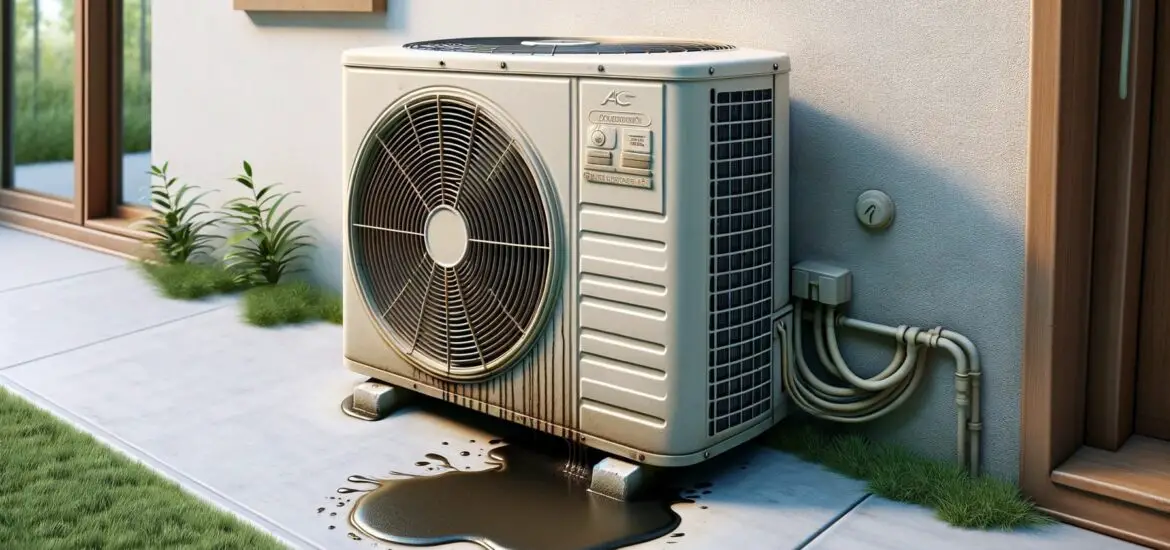This comprehensive guide will reveal what causes freon to leak in your air conditioning system. We’ll also help you identify and address these issues effectively.

Table of Contents
What Causes Freon to Leak
Freon leaks can occur due to a variety of reasons, ranging from normal wear and tear to manufacturing defects. Understanding these reasons is key to diagnosing and fixing leaks promptly.
Wear and Tear
Wear and tear is a natural and inevitable process that affects all mechanical systems over time, including your HVAC system. The refrigerant lines, which are crucial for the circulation of freon, are particularly susceptible to this.
As these lines age, they can develop tiny fissures or holes due to the constant pressure fluctuations and temperature changes they undergo. This degradation can lead to small, sometimes imperceptible, leaks of freon.
Regular wear and tear can be exacerbated by factors like vibrations from the HVAC unit, exposure to extreme weather conditions, and even the quality of the material used in the refrigerant lines.
Regular system check-ups, ideally twice a year, can help in identifying signs of wear and tear early. During these check-ups, a technician will inspect the refrigerant lines for any signs of damage and perform necessary repairs or replacements to prevent leaks.
Improper Installation
Improper installation of your HVAC system can lead to numerous problems, including freon leaks. This issue often stems from poor workmanship during the installation process.
Common mistakes include under-tightened or over-tightened connections, improperly fitted components, or the use of substandard materials. These errors can create weak spots in the refrigerant lines or connections, leading to leaks over time.
Another aspect of improper installation is the incorrect placement of the HVAC unit, where it might be more susceptible to damage. For example, placing the outdoor unit in an area where it’s exposed to more physical stress or environmental factors can lead to quicker degradation.
To avoid these issues, always hire a certified and experienced HVAC technician for installation. If you suspect that your system was improperly installed, it’s advisable to have a professional reassess and correct any installation errors.
Corrosion
Corrosion in HVAC systems, particularly in the refrigerant lines, is a significant cause of freon leaks. Corrosion occurs when metal components are exposed to corrosive substances or environments.
In the case of HVAC systems, this could be due to exposure to chemicals, salt (in coastal areas), or even excessive moisture. Rust and corrosion can weaken the refrigerant lines, leading to the formation of holes and cracks.
In addition to external corrosion, HVAC systems can also suffer from a type of internal corrosion called formicary corrosion. This is caused by the presence of certain acids or chemicals in the air that react with the copper tubing in refrigerant lines.
Preventing corrosion involves regular cleaning and maintenance of your HVAC system, ensuring good drainage around the unit, and in some cases, applying protective coatings to metal parts. It’s also important to ensure that the air around the HVAC system is as clean as possible to prevent formicary corrosion.
Regular inspections by a professional can help identify early signs of corrosion and take appropriate measures to mitigate it.
Detecting and Repairing Freon Leaks
Detecting a freon leak early is key to maintaining your HVAC system’s health and efficiency. Common signs include a decrease in cooling efficiency, ice formation on the AC unit, and a hissing sound from the refrigerant lines.
If you suspect a leak, it is crucial to consult a professional for detection and repair. Professionals use various tools and techniques, such as electronic leak detectors or UV dye tests, to accurately locate leaks.
Preventive Measures to Avoid Freon Leaks
Preventing freon leaks is better than fixing them. Regular maintenance is vital. Having your HVAC system inspected by a professional at least once a year is crucial.
Keep the unit clean from dust and debris. It’s also important to promptly address any minor issues before they turn into larger problems.
In addition, be aware of the age of your system; older systems are more prone to leaks. Therefore, they might need more frequent inspections or even a replacement.